Does Iowa Senate Democrats’ ouster of minority leader reflect problems within the party?
- Oops!Something went wrong.Please try again later.
- Oops!Something went wrong.Please try again later.
When Iowa Senate Minority Leader Zach Wahls fired two longtime Democratic caucus staffers on a Friday afternoon, the discontent immediately began to percolate.
Fellow Democratic senators expressed frustration that they weren’t consulted on the abrupt change, but it took until early the next week for it to become clear that those conversations were anything more than just disaffected grumbling.
By Wednesday evening, though, the decision was unanimous. Wahls, 31, was out. The caucus decided to replace him with Sen. Pam Jochum, a respected 30-year veteran of the Iowa Legislature who immediately took over as minority leader.
The decision caught political observers off guard. Though the change is ultimately a matter of internal politics, the leader is a prominent face of the party and has a major role in winning back seats for Democrats, who are deep in the minority.
So how did it all go astray?
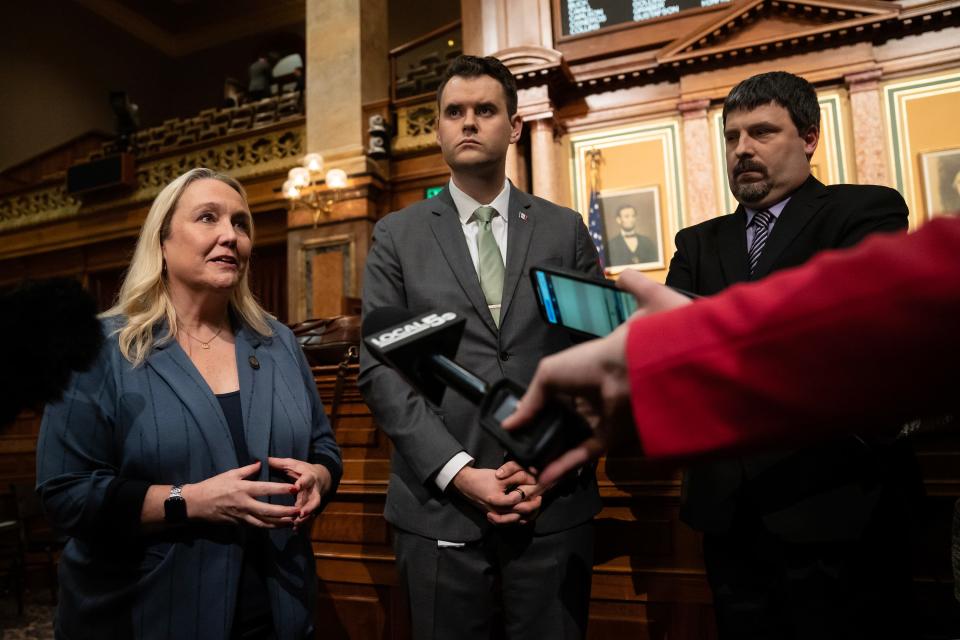
Interviews with nearly 20 people involved in Iowa Democratic politics pointed to a divide over the change and whether it signifies bigger problems within the party.
Some, like Jochum, 68, say leadership changes within the minority party are not unusual and don't necessarily represent broader disagreements over vision or direction. They say the party is bigger than one individual leader.
Others, like Wahls, believe that some Democrats are unwilling to make the kinds of difficult choices that are necessary to chart a new course and win elections.
In an interview with the Des Moines Register, Wahls said he felt that his vision for reversing the declining trajectory of the Democratic Party met resistance from an old guard unwilling to embrace change — a dynamic that he believes is at the root of the decision to replace him.
“The status quo of the last decade has not worked for the Iowa Democratic Party, and it hasn't worked for Iowans. It just hasn't,” he said. “… I think we had a lot of energy, a lot of momentum on that vision, that mandate for change. But unfortunately, change is hard. And I think we've seen just how hard it is.”
In an interview, Jochum said the caucus chose to replace Wahls not because they opposed his vision for change, but because too many senators felt left out of his decision-making process. The staffing decision, which was done without consulting the caucus, she said, was “the final straw.”
“Change requires bringing people along,” she said. “And Zach's goal may have been to do the best for all of us. However, he was also making more and more decisions without the support of our members. … You've got to tell them what you're doing, how you're doing it, why you're doing it.”
Iowa Sen. Zach Wahls: ‘I tried to make it work’
The Senate Democratic caucus has withered, losing 10 seats in the last 10 years — losses that mirror those in other races up and down the ballot. The party now holds just 16 seats in the 50-member Senate, its fewest in 50 years.
Wahls, who rose to prominence as a 19-year-old in 2011 after defending marriage equality in a viral speech from the floor of the Iowa Legislature, was elected to the Senate in 2018. In 2020, his colleagues elected him to serve as minority leader.
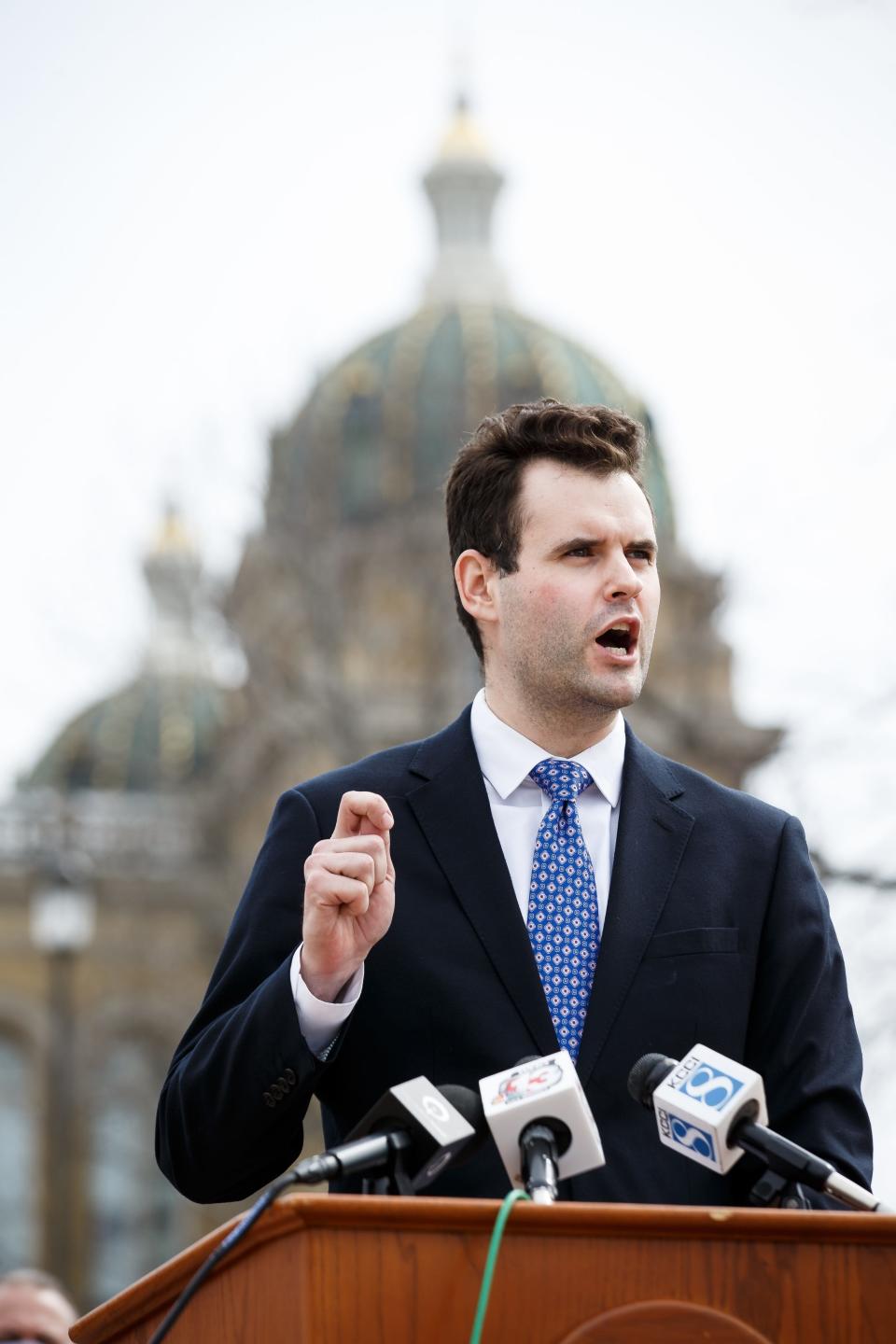
When he came into the leadership position, Wahls said he asked to see the strategic plan the caucus was using.
“There was no plan,” he said. “And it took, I mean, frankly, it took a huge amount of time and energy just to convince people that we needed a plan.”
He said his vision for winning back seats included a focus on being proactively engaged with Iowa voters.
“For 2½ years I had been working toward trying to get our caucus more focused on things like constituent service, clear expectations for every senator whether you're in a safe seat or in a competitive seat, trying to raise the bar for our expectations of each other in terms of things like fundraising, staying on message, showing up for each other in community events,” Wahls said.
But Wahls said he met pushback from within his staff and the Senate caucus on executing the plan, which ultimately led him to fire Senate staffers Eric Bakker and Debbie Kattenhorn. Both had been hired by former Senate Democratic Leader Mike Gronstal.
“I think that in order to be successful, any leader needs to have a team who is helping them move in the right direction,” he said. “… And especially when you're trying to do something new, something like really big, that's critically important. And I tried to make it work with the team, obviously, that I inherited for 2½ years. (I) wasn't able to go in the direction that I felt we needed to go in order to better serve like our constituents in our state.”
Bakker and Kattenhorn have since been rehired to their former positions and have resumed work. Both declined to comment.
Sen. Claire Celsi, D-West Des Moines, said many senators didn’t agree with Wahls’ reasons for firing Bakker and Kattenhorn.
“I think Zach had a rationale in his head for it, but I don’t think it resonated with the rest of us,” Celsi said.
Sen. Pam Jochum: ‘This was not based on a single incident’
Several senators said the decision to remove Wahls went beyond the firing of the two longtime staffers.
Jochum said there were issues regarding a lack of communication that predated the decision.
“These are things that have been going on for several months prior to that final act of firing two of our staff,” she said. “This was not based on a single incident.”
Jochum said it’s “absolutely not true” that the party is reluctant to change.
“We are very committed to trying to build that bench, mentor new people into our party and into our caucus to take on those leadership roles,” she said.
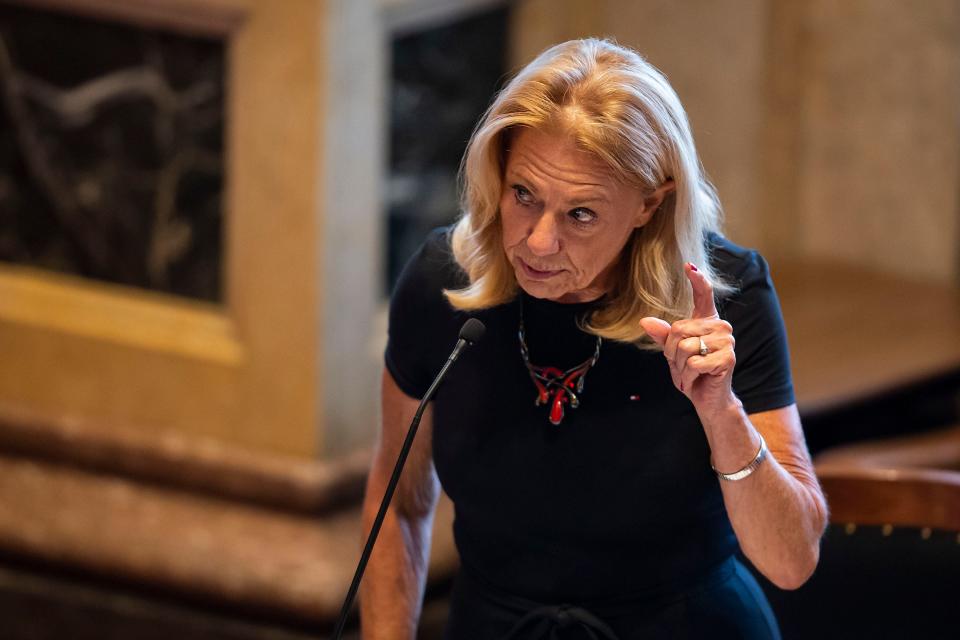
Other Democratic senators echoed similar sentiments.
“We kind of felt like, I think, that big consequential decisions were being made without really running it by the leadership team or the caucus as a whole,” Celsi said. “So I think that’s really the crux of it. So we decided to make a change.”
Sen. Molly Donahue, D-Cedar Rapids, said there was no single cause for the change.
“As a caucus, we decided that change was needed to both strengthen the relationships among us and ensure all voices of our caucus were heard,” she said.
Several Senate Democrats also emphasized that the caucus is ready to move on and look toward winning back seats in 2024.
“It has not caused a rift,” Jochum said. “No, I truly can say that right now, our caucus is more united right now than I probably have seen it in probably more than two years. Truly."
“This, to me, isn’t even a real issue because the real issue is what we’re doing on a daily basis to help Iowans,” Donahue said. “And that’s where we’re going to put our focus.”
Celsi said the caucus’ first Zoom meeting after the shake-up was positive and forward-looking.
“It was business as usual,” she said. “We were talking about consequential issues like abortion: Are we going to have a special session? What’s our strategy?”
“So I kind of feel like it got back to normal pretty quickly,” she said.
Labor lobbyists get involved in dispute
While Senate Democrats indicated they want to quickly move on from the dispute, it could have wider fallout.
Two lobbyists who appear to have been involved in the effort to remove Wahls as leader have faced pushback from their respective organizations.
Gronstal, the former Senate Democratic leader, lost his sole client as a lobbyist because of his part in the shake-up. The Iowa State Building and Construction Trades Council said in a statement shortly after the leadership changeover that it decided to end its relationship with Gronstal “over concerns related to his involvement in recent internal Senate Democratic caucus matters.”
And in a letter obtained by the Des Moines Register, Teamsters Local 238 Secretary-Treasurer Jesse Case chided Charlie Wishman, president of the Iowa Federation of Labor and a Capitol lobbyist, for launching “an unauthorized and covert campaign against Senator Wahls.”
In the letter, Case accused Wishman of acting unilaterally on behalf of the organization and its members by taking on Wahls, who “was a labor-endorsed candidate who is working closely with allies and affiliates.”
Both Gronstal and Wishman have been Iowa Capitol fixtures for years, and labor groups have historically been major backers of the Democratic Party.
Their involvement rankled some observers, who said it reinforced their belief that longtime members of the party were more interested in protecting their friends than changing direction.
“Protecting entrenched interests has to take a backseat to winning elections,” one Democratic operative said.
Reached by phone, Gronstal declined to comment. Wishman did not respond to multiple requests for comment.
Case also could not be reached for comment.
Some Democrats fear Zach Wahls’ ouster sends the wrong message
Other Democrats worried about the effects the leadership shake-up would have on fundraising and candidate recruitment, as well as the message it could send to younger Democrats.
Wahls — a prolific fundraiser with a national profile and a connection to a youthful, urban base — represented, for many, a new vision for how the party could connect with voters and work to reclaim relevance in a state that has taken a hard-right turn over the last decade.
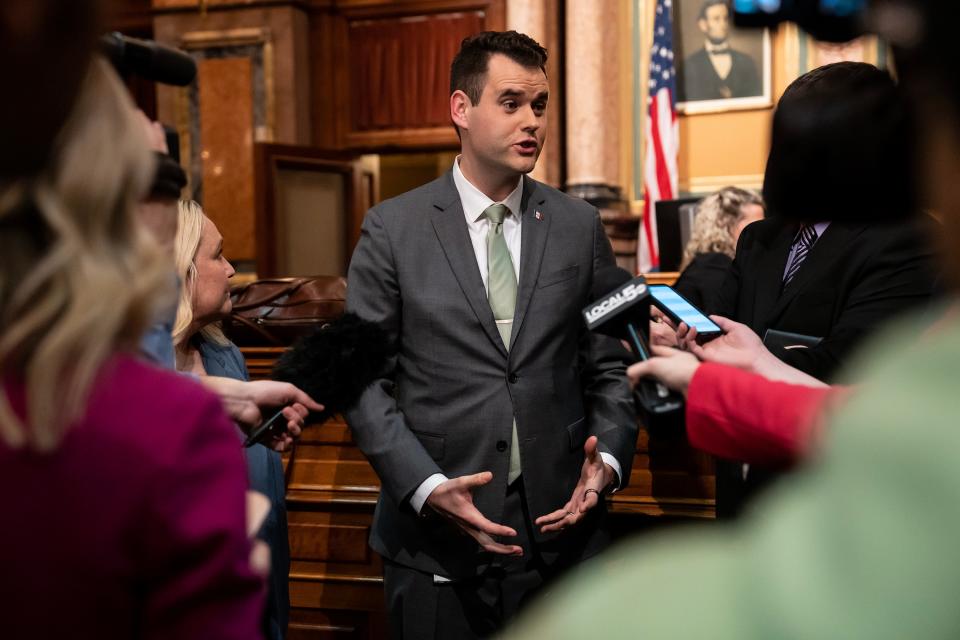
“Pam Jochum is very qualified,” said former state senator and Democratic donor Jack Hatch. “But when you're a party that's trying to reach the younger generation, the generation that is poised to take over the political reins of your party, the last thing you do is fire the individual that represents that political generation.”
One Democratic operative called the decision to remove Wahls “shortsighted” in large part because of his ability to raise money and the enormous boost that gives to the caucus’ election efforts.
“Zach Wahls has been a fundraising powerhouse from the beginning,” the operative said. “… He's brought in national money, which nobody has done for a very long time.”
But longtime Democratic operative Matt Paul called the situation “a bump in the road” rather than a significant hurdle with looming implications for the party.
“Don't get wrapped up in inside-the-Capitol drama,” he cautioned Iowa Democrats. “Stay focused on the tremendous contrast opportunities that exist with the radical agenda the Republicans want to continue to push.”
Jochum said Iowa Democrats remain “very supportive of Zach’s future” and want to help him be successful, and they remain open and encouraging of Democrats at every level of the party.
“We want young people. We want new people to join us,” she said. “We need to expand that coalition, because regardless of how old we are, we are all trying to move in the same direction to protect the democracy to expand our rights and to protect the rights we currently have.”
Democrats face a challenging 2024 map
Leadership changes are not unheard of for a party in the minority.
Before electing former Sen. Bill Dix, R-Shell Rock, as minority leader in 2013, Senate Republicans had six leaders in seven years. Dix resigned in 2018 after a video surfaced of him kissing a lobbyist.
Senate Democrats have also seen leadership changes in the middle of election cycles.
In 2017, Senate Democrats ousted former Sen. Rob Hogg, D-Cedar Rapids, as leader, replacing him with Sen. Janet Petersen, D-Des Moines. Iowa Starting Line reported at the time that lackluster fundraising was part of the reason for the change.
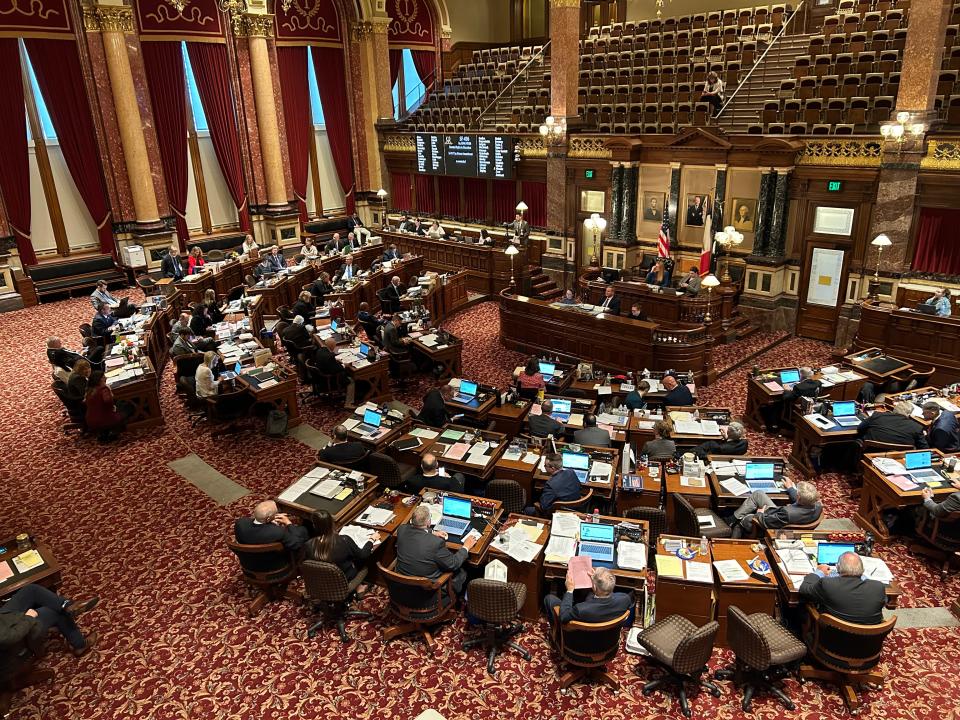
Hogg had replaced Gronstal, who lost his seat in the 2016 election, the same year that Democrats lost their Senate majority.
Senate Democrats face a challenging electoral map next year as they try to protect incumbent senators around the state and flip Republican-held seats in places like Urbandale.
Jochum's task as leader will be to recruit candidates and raise money to defend Democrats like Sen. Sarah Trone Garriott. Trone Garriott won a hard-fought race against former Senate President Jake Chapman to flip a Republican-held Senate seat in Dallas County — providing a rare bright spot for Democrats last year.
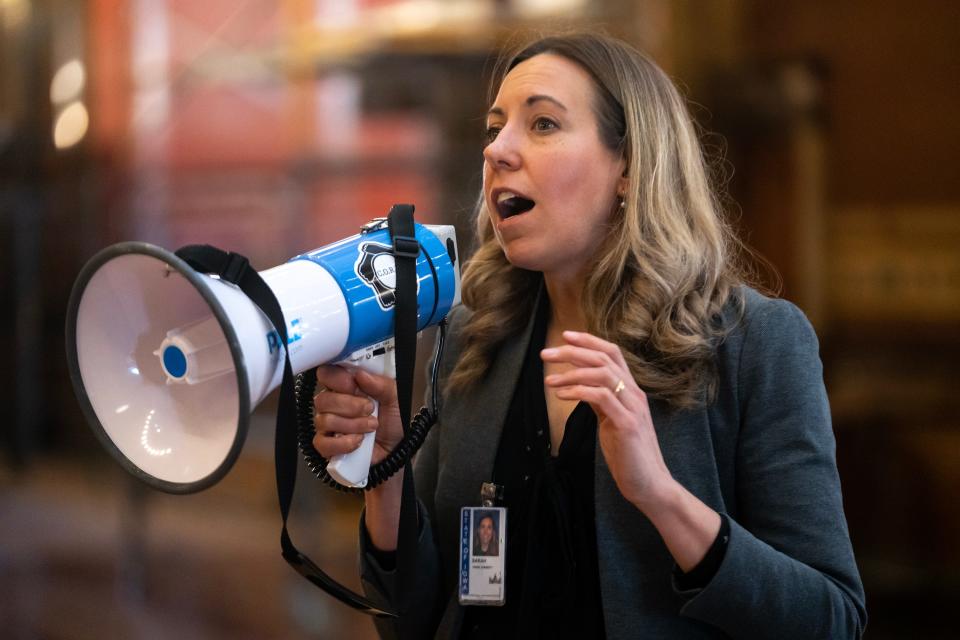
Trone-Garriott said she appreciates the support Wahls gave her in the 2022 race.
“His leadership made it possible for me to win my campaign,” she said. "And he did some incredible work to come up with the resources to make sure that I was able to win. And I just appreciate that so much.”
But, because of a quirk of Iowa’s redistricting process, Trone Garriott is one of several senators who will be up for reelection again in 2024, rather than serving a full four-year term.
She praised Jochum for taking the reins as leader.
"She’s stepping up in a new way and trying very, very hard to help us come together and go forward,” Trone Garriott said. “And she’s got some real gifts to share with us and I appreciate that, too.”
Another complicating factor: Jochum’s Senate term is up next year and it’s unclear whether she’ll be on the ballot.
She declined to say whether she intends to seek reelection.
“I am focused on being a leader of this caucus,” Jochum said in a statement. “A priority for me to is mentor the younger members of our caucus and have a more inclusive approach to bring more members in on decisions. I am focused on keeping and gaining Democratic seats.”
Brianne Pfannenstiel is the chief politics reporter for the Register. Reach her at bpfann@dmreg.com or 515-284-8244. Follow her on Twitter at @brianneDMR.
Stephen Gruber-Miller covers the Iowa Statehouse and politics for the Register. He can be reached by email at sgrubermil@registermedia.com or by phone at 515-284-8169. Follow him on Twitter at @sgrubermiller.
This article originally appeared on Des Moines Register: Inside Iowa Senate Democrats' surprise move to oust minority leader

